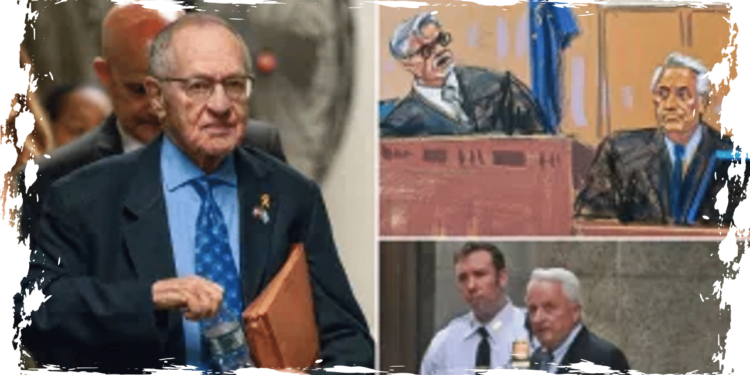I have seen and participated in trials all over the world. I’ve witnessed justice and injustice in China, Russia, Ukraine, England, France, Italy, and Israel, as well as roughly 40 of the 50 states.
But in my 60 years as a lawyer and law professor, I’ve never witnessed anything like what I saw sitting in the front row of the courthouse yesterday.
The judge in Donald Trump’s trial was an utter tyrant, but he appeared to the jurors to be a kind ruler. He seemed to rule against the defendant at every point.
Many experienced lawyers raised their heads when the judge rejected clearly relevant defense evidence while accepting irrelevant prosecution evidence.
However, when the defense’s single substantive witness, seasoned attorney Robert Costello, raised an eyebrow at one of New York Supreme Court Justice Juan Merchan’s findings, the court went crazy.
The judge lost his temper and exposed his thin skin, clearing the courtroom of everyone, including the journalists.
For some reason, the court allowed me to stay, and I witnessed one of the most astonishingly wrong-headed biases I’ve ever seen. The court even threatened to strike all of Costello’s testimony if he raised his eyebrows again.
That, of course, would have been unlawful because it would have denied the defendant’s Sixth Amendment right to confront witnesses and provide a defense.
Any accusations made against a witness would have resulted in punishment for the defendant.
Even if what Costello did was wrong, which it was not, it would be completely inappropriate and illegal to strike his testimony, which undermined and contradicted the government’s star witness.
The judge’s threat was completely inappropriate, immoral, illegal, and petty.
Furthermore, his demeanor while issuing that unlawful threat demonstrated his complete contempt for the defense and anyone who testified for the defendant.
Because the case isn’t on television, the audience must rely on biased reports from political journalists instead of being able to watch the judge in action.
However, he cleared the courtroom, denying the public the chance to hear from journalists who saw the judge in action.
I was one of the few witnesses to his inappropriate behavior who stayed behind to notice his serious flaws.
Journalists should exercise caution when reporting on court proceedings. When you watch CNN or MSNBC, you will usually see an account of a trial that never took place.
They spin the events so much that reality becomes completely warped.
Yesterday, I personally witnessed that distortion when I approached one of my former students and research assistants, a CNN legal analyst named Norman Eisen, during a break and inquired about his family. We chatted for a few minutes in the most amicable manner.
However, NBC, The Daily Beast, and other media outlets decided to fabricate a story about the event. They stated that I had a fight with my nemesis rather than a polite talk with a previous student. Although they fabricated their story, the media widely shared it.
To his credit, Eisen responded to the media to retract the story, claiming that the individual sitting next to him would confirm the media’s incorrect reporting. I doubt we’ll see a retraction.
This small episode is just the tip of a very broad and deep iceberg of false reporting about the trial, which can only happen because the hearings are not broadcast.
There are television cameras in the courtroom that record and transmit every word, but only a few reporters in the overflow room can see what the cameras are transmitting.
There is no compelling reason not to broadcast a trial of this magnitude, or any trial, live and in real time. Allowing the public to observe their courts in action is the most reliable guarantee of justice. As Justice Louis Brandeis eloquently stated a century ago, “sunlight is the best disinfectant.”
When I was a kid growing up in Brooklyn, we would listen to Red Barber’s colorful report of Dodger games on the radio.
When I went to a game and carried my portable radio, I could hear the “old redhead,” as we called him, colorfully expound and exaggerate what was going on on the field.
With the introduction of television, which allowed everyone to watch the games live, the accounts became much more realistic as we could see everything for ourselves.
A similar scenario would occur if trials were televised; commentators would be forced to give the truth and nothing else.
Today, there is no check on partisan trial reporting, and exaggerations and personal viewpoints are common.
The American people are the losers.
Alan Dershowitz is an emeritus professor at Harvard Law School.










